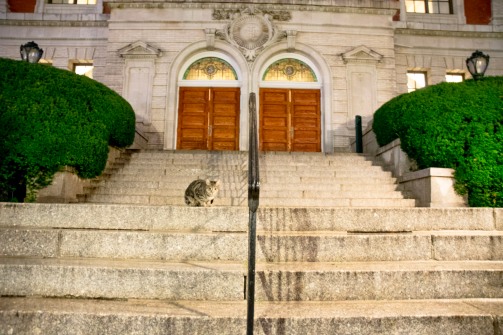
Facilities is planning changes to make Collins, a building that poses challenges to disabled students, more accessible. (Andrea Garcia/The Fordham Ram).
Victor Ordonez
Upon the completion of Collins Hall, one of three projects currently being reviewed by Facilities Management, Fordham University’s “Rose Hill campus will be completely wheelchair accessible,” according to Marco Valera, vice president of Facilities Management.
He said these plans will include multi-million-dollar renovations.
“We want to do it right,” said Valera.
Other buildings on campus are being renovated to improve overall accessibility. Valera is working on improving accessibility in McGinley Center. The center of student life has an elevator, but its faulty lift system currently in place necessitates renovations.
“I don’t know who built that thing,” said Valera, regarding the McGinley Center lift. “It doesn’t even come level with the floor. But we plan on fixing this with a new lift.”
An elevator will be installed in Cunniffe House by late 2017, according to Valera.
Changes to Collins Hall include the installation of an interior lift and an elevator. The interior lift will provide theater stage access to students.
With no elevator or ramp, it is nearly impossible for a respective student with a handicap to enter or even travel within Collins Hall.
USG members had originally brought attention to Collins accessibility problems in early 2013.
In early 2015, former United Student Government (USG) Executive President Nevin Kulangara again called for improvements to be made to Fordham’s Rose Hill Campus.
Collins was once again named in this called for action. “It’s a building that is just closed off to a certain portion of the student body,” Kulangara told The Fordham Ram.
Facilities Operations is focusing on other projects as well, such as energy efficiency.Currently, the department is replacing all of the lights at Rose Hill with high energy efficient LED light.
Walsh Library was one of the first buildings to take part in the renovations. The building now consumes 20 percent less energy. The project is expected to be completed by 2018.
Another project on Facilities radar is expanding the McGinley Center to address overcrowding. Samantha Spallina, FCRH’18, is a former student athlete who frequents the Rose Hill fitness center in the McGinley Center.
“It is nearly impossible to work out on a crowded day,” said Spallina. “I’ve often had to turn around and go home halfway through a workout simply because there wasn’t enough space in the weight room.”
However, the addition to McGinley Center is expected to cost upward of $80 million and is not on Valera’s five-year plan since it will require extensive fundraising. According to Valera, the extension will fill in the open lawn in front of McGinley Center.
The Americans with Disabilities Act of 1990 (ADA) makes it illegal for buildings to be inaccessible for the disabled. Collins Hall, however, continues to escape those regulations because was built in 1904.
